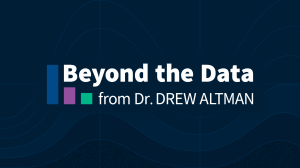The Problem Isn’t Trust in Vaccines, It’s That People Don’t Know Who to Trust
As you all know, vaccines are a hot issue again, and on the minds of everyone in the public health community after a shooter, apparently blaming his depression on Covid vaccines, sprayed hundreds of bullets at the CDC.
Should people really figure out what’s best for them, with their doctor? Or should they rely on scientific agencies like the CDC and FDA and top public health officials for their information about vaccines? Has public trust in the safety of vaccines really eroded significantly? Why do views of vaccines seem to divide so sharply along partisan lines like they were presidential candidates?
We have been tracking public attitudes towards vaccines on a regular basis since the beginning of the Covid epidemic, including surveying the public again about them in April. These are some key take-home messages from our polling, along with my analysis:
- Public confidence in the safety of vaccines for measles, mumps, and rubella (MMR) is highest at 83%, next highest for flu (74%), then falls off for Covid vaccines (56%), and drops to 32% for mRNA Covid vaccines.
- But that’s NOT because people think mRNA vaccines are unsafe. Notably, just 16% think that. It’s because 52% “don’t know enough to say.” Even 59% of MAGA supporters say that. That’s likely why trust in safety is lowest for mRNA vaccines: the most controversy and possibly the most misinformation has been generated around them, leaving people unsure and confused.
- That’s also a reason many people are not getting boosted. Uncertainty breeds inaction. There are, of course, other reasons people don’t get boosted. Many with lower risk factors just don’t see Covid as that serious anymore.
- Much of this reflects the polarized debate we’ve had about vaccines. There are stark differences between Democrats and Republicans on Covid vaccines: 87% of Democrats say they are safe, but just 30% of Republicans and 27% of MAGA supporters do. We have seen this gaping partisan divide on almost every question we have asked about vaccines since we launched our Vaccine Monitor in 2020. It says a lot about our country and the state of our politics that party affiliation is such a strong predictor of views and behavior on vaccines.
Where do people go for answers? No longer to our federal scientific agencies, apparently. Just 14% of the public say they have a lot of confidence in federal government health agencies like the CDC and FDA to ensure the safety and effectiveness of vaccines approved for use. That could be because Democrats don’t trust the current administration (just 19% of Democrats say they have a lot of confidence in the CDC and FDA when it comes to vaccines), or because Republicans don’t trust these agencies generally (just 13% of Republicans trust them a lot when it comes to vaccines). There are always some hard liners who never trust the government, but ideally the public is supposed to trust these agencies fully, not a little bit, or halfway. These days, partisans on both sides have their reasons not to trust.
People tell us they get a lot of information on social media. But, they also tell us they don’t trust it, adding to public uncertainty. It’s one reason people always tell us they “need more information.” Many have lost their traditional anchors on what is true, such as official government sources, experts, and the news media. They now rely on family and friends but know these are imperfect sources of scientific information. It’s why everybody is “doing their own research.” It may in some ways be a virtue, but it’s also a fallback.
People are bewildered by a supercharged and polarized debate about vaccines and no longer know where to turn for scientific information they can rely on. They may turn to their doctor, but most practicing physicians are not scientists or public health experts, and they have a lot on their plate in their practices every day. Their views are often driven by their own more limited patient experiences and often, by partisan affiliation too.
Sure, after the Provincetown outbreak in the summer of 2021, science and the country learned the hard way that the vaccine didn’t provide iron-clad protection against infection, but it did, and does, protect against more severe disease and hospitalization. Overall, only a small share of the public think vaccines may not be safe. The vaccines are not the culprit—we and the state of our politics and the distrust in science and our scientific institutions they breed are.
